Vitamins and minerals play a crucial role in a child’s growth and development. As parents aim to ensure their kids receive these vital nutrients, they often contemplate giving them vitamin supplements. Before doing so, it’s important to choose the right multivitamin tailored for children and teenagers. This ensures they receive the necessary nutrients without the danger of an overdose.
In this article, we’ll provide recommendations for suitable multivitamins and offer tips for making an informed choice.
- Best overall multivitamin with Omega-3
- Best multivitamins for kids aged 4 and up
- Best multivitamin for toddlers aged 2-3
- Best for 2-3 year olds with probiotics
- Best vitamins for teens aged 13-17
- Best Iron-infused vitamins for picky eaters
- Best whole food source children’s vitamins
- Common questions about kids’ multivitamins
Best overall multivitamin with Omega-3
The SmartyPants “Kids Formula” gummies are NSF-certified and provide 15 essential nutrients. They’re our top recommended children’s multivitamin. They not only deliver vital nutrients for kids but also include Omega-3 fatty acids, ensuring a well-rounded vitamin boost. Do note, however, that they don’t contain iron or calcium. For extra iron and calcium, you’d need to give your child separate supplements.
These gummies are allergen-free — no dairy, eggs, peanuts, tree nuts, soy, gluten, or wheat. They’re ideal for children with allergies. They also shun synthetic dyes and artificial flavors. Instead, they come flavored and colored naturally with organic black carrot juice and turmeric.
*120 gummies per pack; recommended 4 gummies daily; available in berry/strawberry flavors; suitable for ages 4 and up
A formula for kids aged 2-3 is also available
All prices in this article are current as of this writing
Each SmartyPants gummy serving contains 5 grams of added sugar. Parents should monitor overall sugar intake throughout the day. And remember, dentists advise proper oral care after eating gummies — rinse or brush promptly to decrease cavity risks.
These gummies also have fish oil, which provides Omega-3 EPA and DHA, known to support heart and brain health.
Pros:
- Great value for money
- Comprehensive vitamin blend
- Contains fish oil, EPA, and DHA
- Free from common allergens
- No synthetic dyes or artificial flavorings
- Formula available for kids aged 2-3
Cons:
- Lacks iron and calcium
- Contains sugar
- Not suitable for vegetarians
- Gummies can lead to cavities
Ingredients and Recommended Daily Value (DV)
| Nutritional Information | Serving Size (4 gummies) | Daily Value% for Ages 4 and up |
|---|---|---|
| Calories | 35 | – |
| Cholesterol | Less than 5mg | Less than 1% |
| Total Carbohydrates | 7g | 3%† |
| Sugars | 5g | – |
| Added Sugars | 5g | 10%† |
| Vitamin A | 180mcg | 20% |
| Vitamin C | 45mg | 50% |
| Vitamin D | 20mcg | 100% |
| Vitamin E | 6.6mg | 44% |
| Vitamin K | 12mcg | 10% |
| Vitamin B1 | 0.1mg | 8% |
| Vitamin B2 | 0.16mg | 12% |
| Vitamin B6 | 1mg | 59% |
| Folic Acid | 250mcg | 63% |
| Vitamin B12 | 2.4mcg | 100% |
| Biotin USP | 16mcg | 53% |
| Pantothenic Acid | 0.375mg | 8% |
| Choline | 12mg | 2% |
| Iodine | 90mcg | 60% |
| Zinc | 1.6mg | 15% |
| Sodium | 15mg | 1% |
| Fish Oil | 340mg | – |
| Omega-3 Fatty Acids | 100mg | – |
| EPA and DHA | 100mg | – |
| Inositol | 2mg | – |
| Vitamin K2 | 8mcg | – |
Best multivitamins for kids aged 4 and up
The Garden of Life’s MyKind Kids gummies are an easy way to give your children essential nutrients without complex chemicals. Made with USDA-certified organic and non-GMO fruits and vegetables like lemons, strawberries, and broccoli, these gummies offer natural nutrients and antioxidants. Suitable for kids aged 4 and older, they’re also popular for their delicious flavors.
120 count; recommended 4 gummies daily; available in strawberry and mixed fruit flavors
What makes these gummies unique? They feature a comprehensive multi-vitamin blend, USDA organic and non-GMO certifications, and are both vegan and gluten-free. Additionally, with their carbon-neutral certification, they’re eco-friendly. A few considerations: they’re on the pricier side and contain 4g of added sugars per serving.
Pros:
- USDA Organic Certified
- Non-GMO Verified
- Vegan and Gluten-Free
- Carbon-Neutral Certified
Cons:
- A bit on the pricey side
- Contains 4g of added sugars
Ingredients and Recommended Daily Value (DV)
| Nutritional Information | Amount per Serving (4 gummies) | Daily Value % For kids aged 4 and up |
|---|---|---|
| Dietary Fiber | 2g | 8% |
| Total Sugars | 5g | – |
| Added Sugars (from organic fruit sources) | 4g | – |
| Vitamin A | 250mcg | 30% |
| Vitamin C | 90mg | 100% |
| Vitamin D3 | 20mcg | 100% |
| Vitamin E | 7.5mg | 50% |
| Vitamin K | 45mcg | 40% |
| Thiamine (Vitamin B1) | 0.5mg | 40% |
| Riboflavin (Vitamin B2) | 0.5mg | 40% |
| Niacin | 4.5mg | 30% |
| Vitamin B6 | 2.5mg | 150% |
| Folic Acid | 200mcg | 50% |
| Vitamin B12 | 3.5mcg | 150% |
| Biotin | 90mcg | 300% |
| Pantothenic Acid (Vitamin B5) | 2.5mg | 50% |
| Zinc | 1.5mg | 15% |
| Selenium | 15mcg | 30% |
| Manganese | 0.2mg | 10% |
| Chromium | 35mcg | 100% |
Best multivitamin for toddlers aged 2-3
The Hiya kids multivitamin is a chewable tablet filled with essential nutrients like Thiamine, Riboflavin, Biotin, and a variety of vitamins and minerals, complemented by an organic fruit and vegetable blend. Developed with pediatricians and nutritionists, this formula bridges common nutrient gaps in kids’ diets.
A highlight? It’s free from added sugars and is sweetened naturally with monk fruit and erythritol. It uses natural flavors and colors, including beetroot, turmeric, and spirulina.
30 tablets per pack; available for monthly delivery; recommended 1 tablet daily; suitable for 2-4-year-old toddlers
This product has been independently tested by Eurofins Scientific for allergens, heavy metals, and pathogens. Certificates of Analysis (COAs) are available upon request.
This multivitamin is suitable for children 2 years and up. For kids aged 2-3, it provides the Daily Value (DV) for most key nutrients. However, for those aged 4 and up, certain vitamin and mineral contents might be low and may not meet daily requirements. Also, it doesn’t contain iron.
Pros:
- Sugar-free
- Independently tested
- No artificial additives or preservatives
- Vegan, gluten-free, dairy-free, non-GMO
- Refillable packaging
Cons:
- Doesn’t contain iron
- Not suitable for kids allergic to certain fruits or veggies (check the ingredient label carefully)
Ingredients & Recommended Daily Intake (DV)
| Nutritional Info | Amount per Tablet | Daily intake % 2-3 years old | Daily intake % 4 years old and above |
|---|---|---|---|
| Total carbohydrates | Less than 1 gram | – | – |
| sugar | 0g | – | – |
| Vitamin A | 360 micrograms | 120% | 40% |
| Vitamin C | 40 mg | 120% | 44% |
| Vitamin D | 25 micrograms | 167% | 125% |
| Vitamin E | 3.5 mg | 58% | 23% |
| Vitamin B1 | 0.5 mg | 100% | 42% |
| Vitamin B2 | 0.6 mg | 120% | 46% |
| Folic acid | 200 micrograms | 133% | 50% |
| Vitamin B12 | 2 micrograms | 222% | 83% |
| Biotin USP | 25 micrograms | 313% | 83% |
| Pantothenic acid | 2.5 mg | 125% | 50% |
| Calcium | 20 mg | 3% | Less than 2% |
| Iodine | 50 micrograms | 56% | 33% |
| Zinc | 3 mg | 100% | 27% |
| Selenium | 15 mg | 75% | 27% |
| Magnesium | 1.5 mg | 125% | 65% |
| Vitamin K2 | 8 mg | – | – |
| Fruit/Vegetable Mix* | 25 mg | – | – |
Best for 2-3 year olds with probiotics
This OLLY Kids Multivitamin gummy is also designed for 2-3 year-olds. It packs in 12 essential vitamins and also includes active probiotics that can help maintain a child’s gut health. If your child is on antibiotics, adding probiotics is especially key, as it can help prevent any upset in their gut flora.
Available in counts of 70/100/120 or as a monthly subscription; recommended dose is 2 gummies daily for those 4 and up, and 1 gummy daily for 2-3 year-olds
Notably, OLLY’s vitamin products undergo third-party testing by NSF International, ensuring that what’s inside matches what’s promised on the label.
This supplement is suitable for kids aged 2 and up, but keep in mind that a child’s age might affect the dosage. So, always read the label closely to determine the right amount for your little one.
Pros:
- Contains probiotics
- NSF certified
- Affordably priced
- Natural flavors
Cons:
- Not suitable for vegetarians
- Contains sugar
Ingredients and Recommended Intake (DV)
| Nutrients | Content per grain | Daily intake % 2-3 years old (1 capsule) | Daily intake % 4 years old and above (2 capsules) |
|---|---|---|---|
| Total carbohydrates | 2 grams | – | – |
| sugar | 1g | – | – |
| Vitamin A | 150 micrograms | 50% | 33% |
| Vitamin C | 15 mg | 100% | 33% |
| Vitamin D | 10 micrograms | 67% | 100% |
| Vitamin E | 3.75 mg | 63% | 50% |
| Vitamin B6 | 0.5 mg | 100% | 59% |
| Folic acid | 100 micrograms | 67% | 50% |
| Vitamin B12 | 1.2 micrograms | 133% | 100% |
| BiotinUSP | 15 micrograms | 188% | 100% |
| Pantothenic acid | 2.5 mg | 125% | 100% |
| Choline | 5 mg | 3% | 2% |
| Iodine | 15 micrograms | 17% | 20% |
| Zinc | 0.75 mg | 25% | 14% |
| Probiotics* | 250 million colony forming units (CFU) 16 mg | – | – |
Best vitamins for teens aged 13-17
Ritual Essential for Teens is a multivitamin tailored specifically for 13-17-year-olds. It contains 10 core nutrients supporting bone and brain health, immune system function, and muscle growth. Vitamins A, D3, E, folic acid, iron, and zinc all play a role in boosting the immune system, while Omega-3 DHA is crucial for brain function. If your teen’s diet lacks fish and dark green leafy vegetables, they might be missing these nutrients. Similarly, vitamins D3, K2, B12, and A also work together to strengthen bones and support muscle growth.
$33 for a 30-count bottle; recommended dose is 2 pills daily; suitable for 13-17-year-olds.
Ritual is an online brand offering a variety of subscription-based health products. They emphasize ingredient transparency and quality control. Each product description lists its ingredients and sources, ensuring products are safe and high-quality. All their offerings are vegan, non-GMO, and undergo third-party testing, ensuring no artificial flavors or synthetic fillers are present. They also maintain strict internal quality checks. A notable feature is that all their products use a delayed-release capsule, making it stomach-friendly.
Additionally, Ritual explains the reasons for choosing or excluding specific ingredients on their official website, aiding consumers in making informed choices. According to Ritual, most people can get adequate amounts of certain vitamins, like calcium and vitamin C, from their regular diet. Ritual Essential for Teens is designed to fill nutritional gaps for teenagers, minimizing the risk of vitamin overdose.
Pros:
- Uses traceable, non-GMO ingredients
- Suitable for vegans and those seeking non-animal derived components
- Free from artificial additives or preservatives
- Delayed-release capsules for enhanced absorption
- Third-party tested
- Offers hassle-free order cancellations
- 30-day money-back guarantee
Cons:
- Omega-3 DHA dosage is below the recommended 1.1-1.6g range for teenagers
- Priced on the higher side
Ingredients and Recommended Daily Intake (DV)
The Ritual Teen Multivitamin has two main differences between its formulas for girls and boys: the amount of folic acid and the inclusion of iron in the formula for girls. Below is a detailed ingredient list:
Ritual Teen Multivitamin – Formula for Girls.
| Nutritional ingredients | Content per grain | Daily intake % (2 capsules) |
|---|---|---|
| Vitamin A | 90 micrograms | 10% |
| Vitamin D3 | 50 micrograms | 250% |
| Vitamin E | 7.5 mg | 50% |
| Folic acid | 400 micrograms | 100% |
| Vitamin B12 | 10 micrograms | 417% |
| Iron | 8 mg | 44% |
| Magnesium | 30 mg | 7% |
| Zinc | 3 mg | 27% |
| Omega-3 DHA | 330 mg | – |
| Vitamin K2 | 90 micrograms | – |
Ritual Youth Multivitamin – Boys Formula
| Nutrients | Content per grain | Daily intake % (2 capsules) |
|---|---|---|
| Vitamin A | 90 micrograms | 10% |
| Vitamin D3 | 50 micrograms | 250% |
| Vitamin E | 7.5 mg | 50% |
| Folic acid | 100 micrograms | 25% |
| Vitamin B12 | 10 micrograms | 417% |
| Magnesium | 30 mg | 7% |
| Zinc | 3 mg | 27% |
| Omega-3 DHA | 330 mg | – |
| Vitamin K2 | 90 micrograms | – |
Best Iron-infused vitamins for picky eaters
Renzo’s Picky Eater is a multivitamin supplement tailored for kids with selective eating habits. It’s packed with 18 essential nutrients, including iron, zinc, iodine, and vitamins like A, C, D3, and K. It stands out as one of the few kids’ vitamins that contain iron, making it an excellent choice for vegetarian kids. Additionally, iodine is beneficial for cognitive development. It’s worth noting that Renzo’s Picky Eater doesn’t include calcium.
60 tablets; recommended 2 tablets daily for kids 4 and up, and half a tablet for 2-3-year-olds
Iron is crucial for healthy red blood cell production. However, many multivitamins usually skip on iron. While most kids can get sufficient iron from iron-rich foods, some, especially those who are picky eaters or on a vegetarian or vegan diet, can easily develop an iron deficiency. Yet, caution is vital as an excessive intake of iron can be harmful to infants and children. So, before considering an iron supplement for your child, it’s wise to check if they are indeed iron-deficient and genuinely require the supplement.
All of Renzo’s products undergo third-party testing, ensuring their quality and safety. They’re also vegetarian-friendly and suitable for kids aged 2 and up.
Additionally, the product is free from sugar, artificial colors, and flavorings. Its sweetness comes from monk fruit, a unique, high-intensity sugar-free sweetener. However, while it’s sugar-free, it contains sugar alcohols like xylitol and mannitol, which, in large amounts, might cause stomach discomfort.
Pros:
- Contains iron
- Vegetarian-friendly
- Dissolvable tablets, won’t stick to teeth
- Third-party tested
- No sugar, artificial colors, or flavorings
- Offers an unconditional money-back guarantee
Cons:
- Priced a bit on the high side
- Some reviews mentioned kids not liking the taste of the vitamin.
Ingredients and Recommended Intake (DV)
| Nutrients | Content per grain | Daily intake % 2-3 years old (half slice) | Daily intake % 4 years old and above (2 pieces) |
|---|---|---|---|
| Vitamin A | 450 micrograms | 75% | 100% |
| Vitamin C | 33.75 mg | 113% | 75% |
| Vitamin D | 7.5 micrograms | 25% | 75% |
| Vitamin E | 7.5 mg | 63% | 100% |
| Vitamin K | 45 micrograms | 75% | 75% |
| Vitamin B1 | 0.6 mg | 60% | 100% |
| Vitamin B2 | 0.65 mg | 65% | 100% |
| Niacin | 8 mg | 67% | 100% |
| Vitamin B6 | 0.64 mg | 64% | 75% |
| Folic acid | 200 micrograms | 67% | 100% |
| Vitamin B12 | 1.2 micrograms | 67% | 100% |
| BiotinUSP | 15 micrograms | 94% | 100% |
| Pantothenic acid | 2.5 mg | 63% | 100% |
| Zinc | 4.13 mg | 69% | 75% |
| Iron | 6.82 mg | 49% | 76% |
| Iodine | 75 micrograms | 42% | 100% |
| Sodium | 27.5 mg | 69% | 100% |
| Chromium | 17.5 micrograms | 80% | 100% |
Best whole food source children’s vitamins
MegaFood Kids One Daily is a whole food-based multivitamin and mineral supplement suitable for children 5 years and older. This children’s vitamin is made with fresh, original, whole foods and contains no sweeteners, flavorings, or food colorings. This type of vegetarian supplement is ideal for parents who want to boost their child’s overall nutrition without adding a lot of extra sugar and ingredients, especially if they are on a vegetarian or vegan diet.
30/60 tables; recommended 1 tablet per day; suitable for children 5 years old and above; can be ordered for regular mailing
Also at iHerb
This supplement is available in tablet form, which is small and easy to swallow and contains a variety of important nutrients, such as vitamins D3, B12 and B6. However, this children’s vitamin contains lower amounts of each nutrient than similar products. Check the nutrition label carefully when purchasing to make sure you are providing your child with adequate nutrients.
Pros:
- Easy to swallow
- Whole Food Basics
- No artificial sweeteners
Cons:
- Relatively low content of each nutrient
- Not tested by third party
Ingredients and Recommended Intake (DV)
| Nutritional ingredients | Content per grain | Daily intake % 5 years old and above |
|---|---|---|
| Vitamin A | 150 micrograms | 17% |
| Vitamin C | 20 mg | 22% |
| Vitamin D3 | 3.3 micrograms | 17% |
| Vitamin E | 3.3 mg | 22% |
| Vitamin K | 22 micrograms | 18% |
| Thiamine | 1.7 mg | 142% |
| Riboflavin | 1.7 mg | 131% |
| Niacin | 7 mg | 44% |
| Vitamin B6 | 2 mg | 118% |
| Folic acid | 226 micrograms | 57% |
| Vitamin B12 | 5 micrograms | 208% |
| Biotin | 100 micrograms | 333% |
| Pantothenic acid | 3 mg | 60% |
| Iodine | 25 micrograms | 17% |
| Zinc | 2 mg | 18% |
| Selenium | 8 micrograms | 15% |
| Copper | 0.03 mg | 3% |
| Manganese | 0.4 mg | 17% |
| GTF Chrome | 10 micrograms | 29% |
| Molybdenum | 7 micrograms | 16% |
| Boron | 167 micrograms | – |
| Food mixture* | 80 mg | – |
Common questions about kids’ multivitamins
Do kids need additional vitamins?
A balanced and healthy diet typically provides adequate vitamins for both adults and children. The American Academy of Pediatrics (AAP) states that children with a balanced diet shouldn’t need extra vitamins. Many children taking multivitamins don’t necessarily need them. [1] Trusted Website PubMed is a data base from US National Institutes of Health. It’s a trusted source of health and medical information. Open the link →
However, infants have different nutritional needs than older kids. For instance, breastfed babies might need extra vitamin D.
Both the AAP and USDA’s Dietary Guidelines suggest that healthy children above one year, with a balanced diet, don’t generally need supplements. They recommend a varied diet comprising fruits, vegetables, grains, dairy, and proteins to ensure children receive all vital nutrients. [2]
How can you ensure your child gets enough nutrients?
Feed your children a diverse range of nutritious foods to get essential nutrients:
- Meals and snacks filled with fruits, vegetables, whole grains, lean meats, proteins, healthy fats, and dairy usually cover their vitamin and mineral needs.
- To boost fruit and vegetable consumption, experiment with various kinds and preparation methods.
- Prioritize whole fruits over juices and limit added sugars and highly processed foods.

If you’re concerned your child isn’t receiving sufficient nutrients from their diet, consider supplements as a safe method to bridge the gap. For concerns about your child’s nutrition, consult a pediatrician or a registered dietitian.
Do kids and adults share the same nutritional needs?
Children require many of the same nutrients as adults, albeit in different quantities.
As children grow, it’s essential to ensure they receive nutrients like calcium and vitamin D for bone development. [3] Trusted Website NCBI, US National Center for Biotechnology Information, is a trusted source of biotechnology and biomedicine information. Open the link →
Nutrients vital for early brain development include iron, zinc, iodine, choline, and vitamins A, B6 (folic acid), B12, and D.
While children may need fewer vitamins and minerals than adults, they still require adequate amounts for healthy growth.
How are kids’ nutritional needs determined?
Nutritional needs for children depend on age, gender, size, growth, and activity levels. Health experts recommend that children aged 2-8 consume 1000-1400 calories daily. For those aged 9-13, they suggest an intake of 1400-2600 calories, contingent on factors like their activity level. [4]
Besides adequate calories, a child’s diet should also align with the following Dietary Reference Intakes (DRIs): [5]
| Nutrients | DRIs 1-3 years old | DRIs 4-8 years old |
|---|---|---|
| Calcium | 700 mg | 1000 mg |
| Iron | 7 mg | 10 mg |
| Vitamin A | 300 micrograms | 400 micrograms |
| Vitamin B12 | 0.9 micrograms | 1.2 micrograms |
| Vitamin C | 15 mg | 25 mg |
| Vitamin D | 600 IU (15 micrograms) | 600 IU (15 micrograms) |
The nutrients listed above are just a few common ones. Kids need a variety of vitamins and minerals for normal growth and health. The specific amounts and types required can vary depending on a child’s age, ensuring optimal health throughout their growth stages.
Which kids might have a nutrient deficiency?
While most kids with a balanced diet don’t need extra vitamins, certain circumstances might warrant supplements. Some children, especially those at risk of deficiencies, might need specific vitamin and mineral supplements.
Vegetarian kids
Kids on plant-based diets could be at risk of lacking calcium, iron, zinc, and vitamins B12 and D, especially if they consume few or no animal products.
Strict vegan diets can be particularly risky for kids, especially if essential nutrients like vitamin B12—found naturally in animal products—aren’t substituted with fortified foods or supplements. Failing to replace these nutrients can lead to severe issues, including abnormal growth and developmental delays.
However, if these vegetarian kids consume a variety of plants rich in or fortified with these vitamins and minerals, they can still get adequate nutrition. [6] Trusted Website NCBI, US National Center for Biotechnology Information, is a trusted source of biotechnology and biomedicine information. Open the link →
Picky eaters
Some studies have linked picky eating in childhood to inadequate micronutrient intake.
A study of 937 kids aged 3 to 7 found that pickiness correlated with lower intakes of iron and zinc. However, the blood levels of these minerals didn’t differ significantly between picky and non-picky eaters. [7] Trusted Website NCBI, US National Center for Biotechnology Information, is a trusted source of biotechnology and biomedicine information. Open the link →
So, if you’re concerned your child isn’t meeting their nutritional needs, it’s best to get them tested for nutrient deficiencies before giving them supplements.
Kids with certain diseases
Children with conditions like celiac disease or Inflammatory Bowel Disease (IBD) might struggle to absorb several vitamins and minerals, particularly iron, zinc, and vitamin D. These diseases can damage parts of the intestines where micronutrients are absorbed.
On the other hand, kids with cystic fibrosis might find it hard to absorb fats, making it challenging to get enough of the fat-soluble vitamins A, D, E, and K.
Children with cancer or other conditions that increase nutritional needs might require certain supplements to prevent malnutrition related to their illness.
What should parents know about kids taking vitamins?
When taken correctly (as per recommended dosages and age guidelines), multivitamins are safe and won’t harm kids. However, as pointed out, the American Academy of Pediatrics believes that children on balanced diets don’t need additional supplements beyond the recommended dietary intake.
The American Academy of Pediatrics also warns that overdosing on certain vitamins, especially vitamins A, C, or D, might lead to side effects like headaches and nausea. Always consult a pediatrician before giving your child multivitamins.
Overconsuming vitamins or mineral supplements can also be toxic for kids, especially the fat-soluble vitamins A, D, E, and K, which get stored in body fat. There have been cases where babies showed symptoms of vitamin D toxicity due to excessive intake. [8] Trusted Website PubMed is a data base from US National Institutes of Health. It’s a trusted source of health and medical information. Open the link →
Gummy vitamins, especially given their candy-like appearance and taste, are easy to overdose on. [9] Trusted Website NCBI, US National Center for Biotechnology Information, is a trusted source of biotechnology and biomedicine information. Open the link → Therefore, it’s best to keep vitamins out of children’s reach and discuss the appropriate amounts with older kids to prevent accidental overconsumption.
How should you choose vitamins for your child?
If your child is picky, follows a restrictive diet, or has absorption issues, they might benefit from extra vitamin supplements. Always consult with a doctor before giving your child any supplements.
Here are some factors to consider when picking vitamin supplements:
- Third-party testing: Choose products verified by third parties to ensure ingredient accuracy, like NSF International, US Pharmacopeia (USP), ConsumerLab.com, Informed Choice, or the Banned Substances Control Group (BSCG).
- Child-specific formula: Opt for vitamins designed specifically for kids, ensuring they don’t contain excessively large doses that exceed a child’s daily needs.
- Age-appropriate formula: Pick products that suit your child’s age. While many vitamin supplements are for kids aged 4 and up, some are made for younger toddlers.
- Nutritional needs: Always communicate with your child’s pediatrician or a registered dietitian to pinpoint what vitamin supplements your child might need.
- Additives and sugar content: Whenever possible, select vitamin supplements with minimal added sugars and artificial additives.
Disclosure: We are an Amazon Associate. Some links on this website are affiliate links, which means we may earn a commission or receive a referral fee when you sign up or make a purchase through those links.
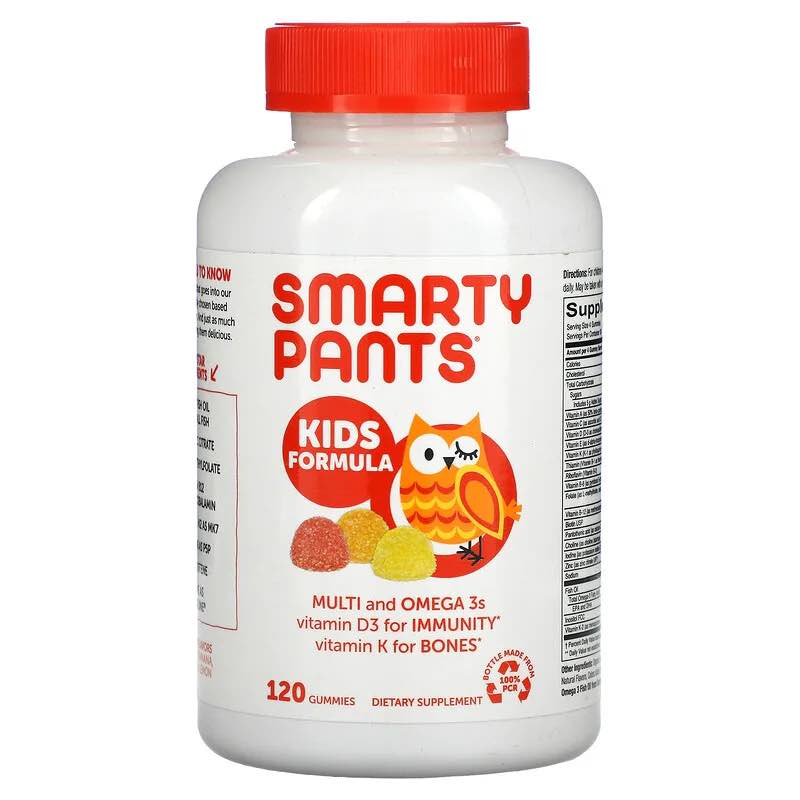
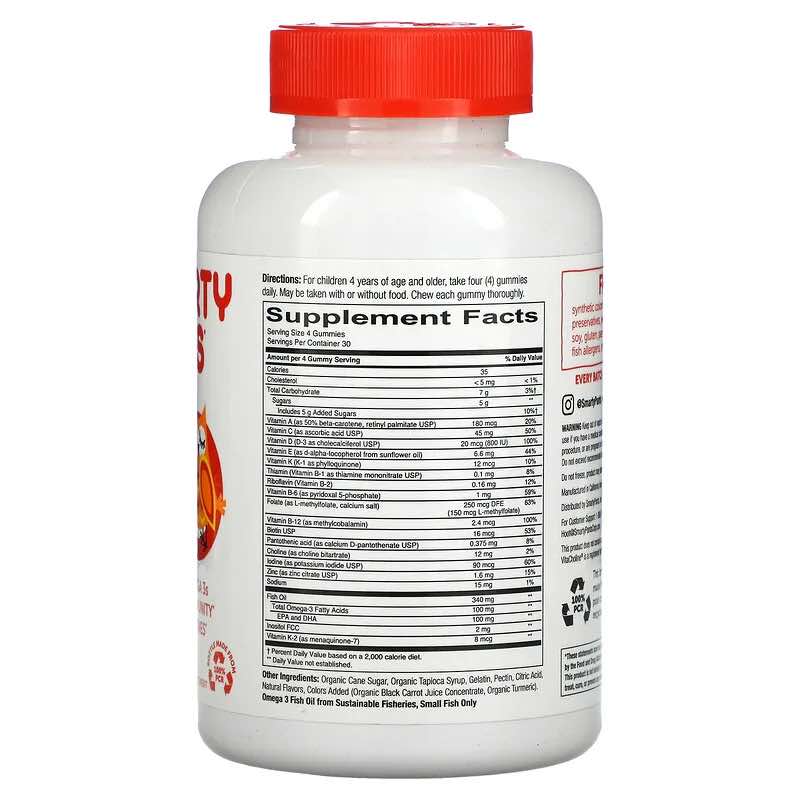
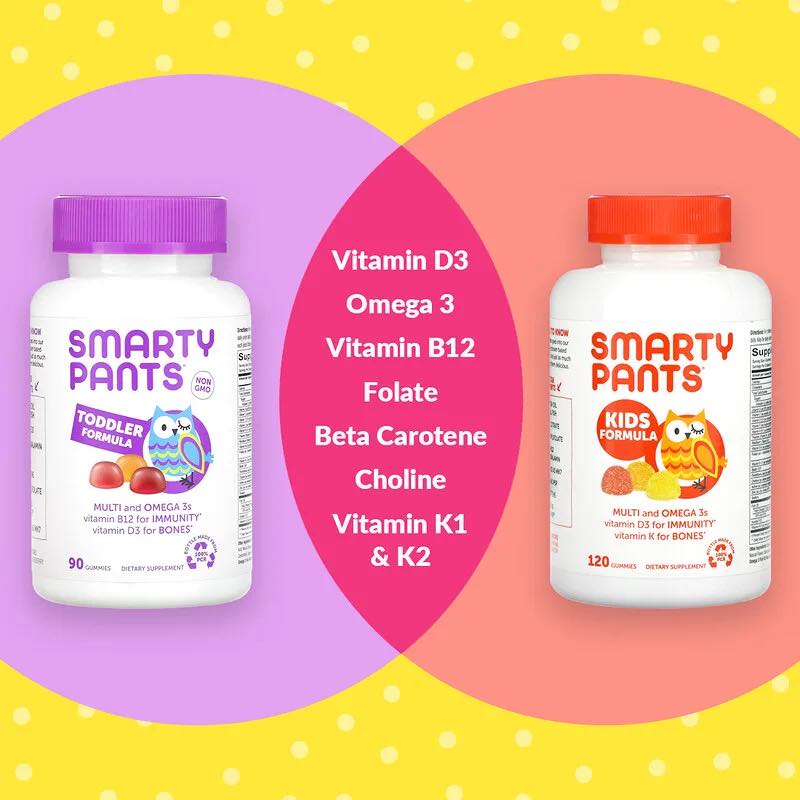



















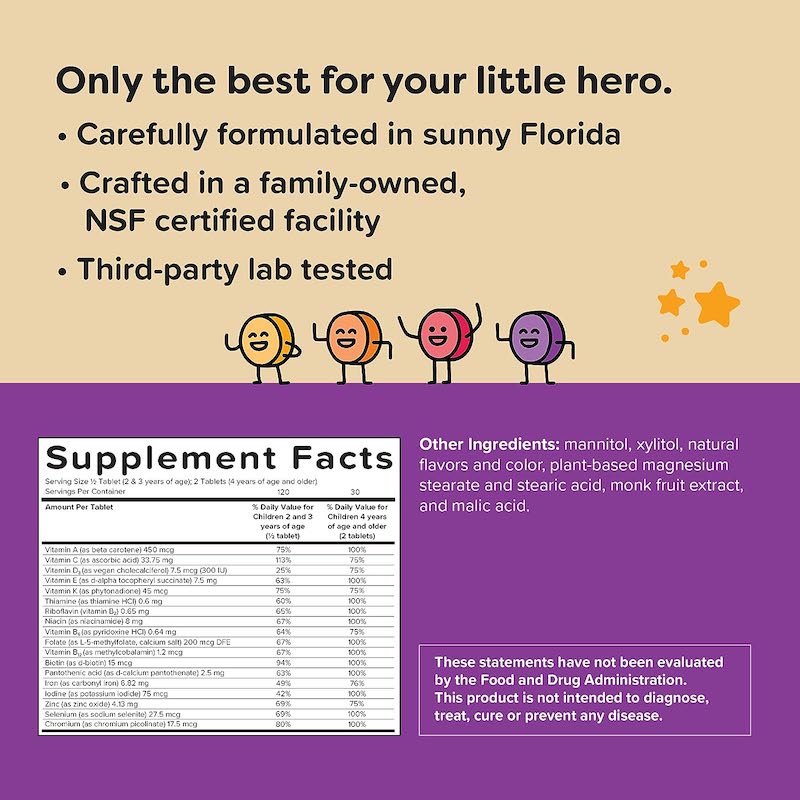









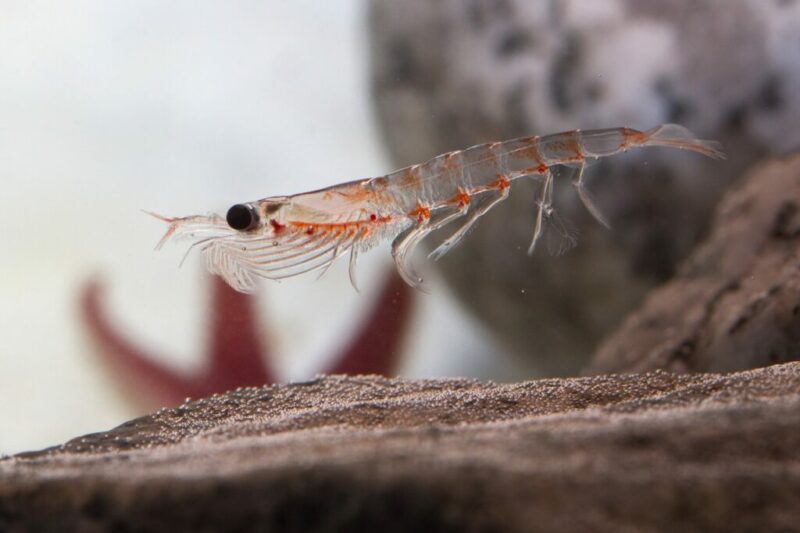






Leave a Reply